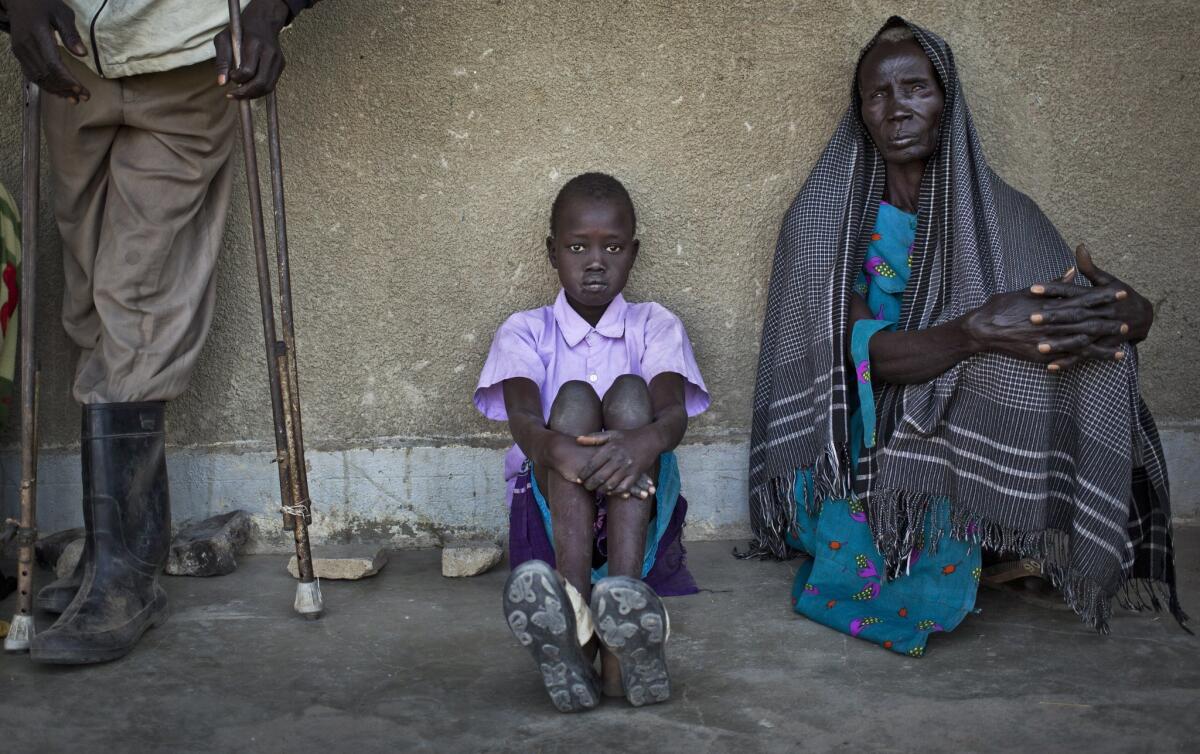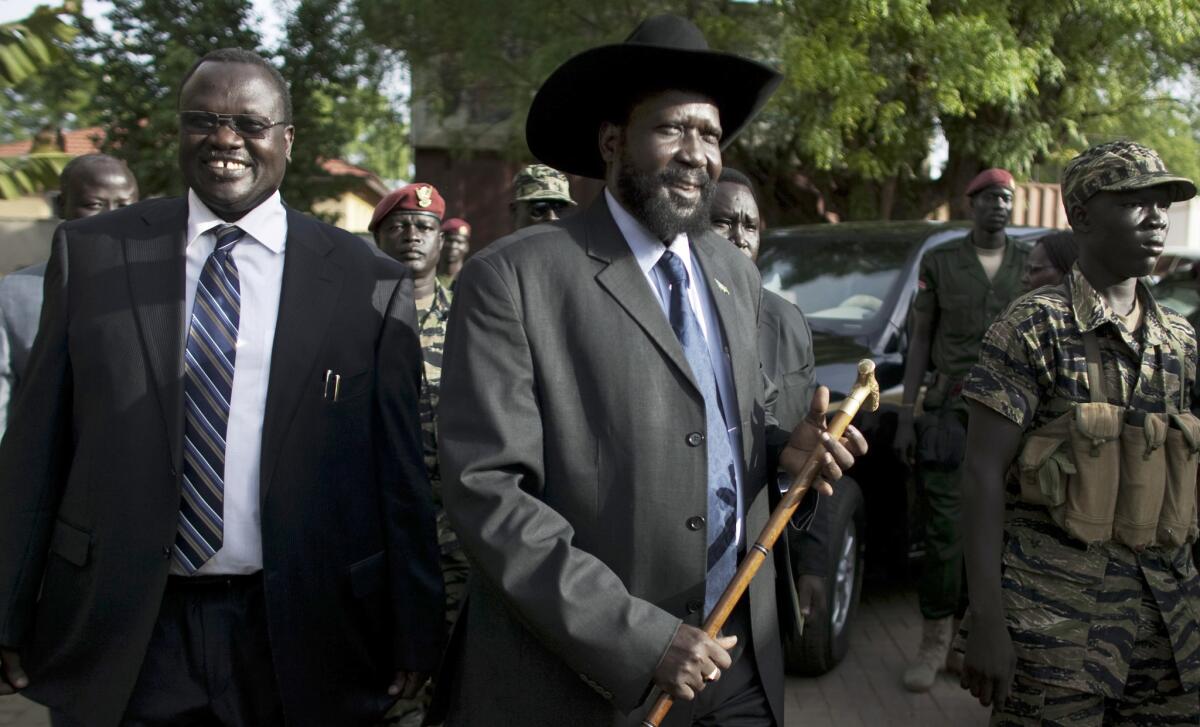Forced cannibalism, gang rape and mass graves: Anatomy of South Sudan’s terrible war

In this 2014 file photo, people displaced by the fighting between government and rebel forces line up for medical care at a clinic run by Doctors Without Borders in Awerial, South Sudan.
- Share via
Reporting from Johannesburg, South Africa — In what could become a landmark for African justice, an African Union report on South Sudan’s war has found evidence of gross human rights atrocities and recommended an African court be set up to prosecute those responsible.
The cruelty to civilians during South Sudan’s two-year war shocked the AU commission, which spared few details in describing the crimes: People were beaten and forced to jump into fires. Bodies were drained of blood and other victims were forced to drink the blood or eat human flesh. Women, old and young, were gang raped and left bleeding and unconscious. Children were forced to fight, or were enslaved by militias.
The report, released late Tuesday, also said mass graves of victims were found.
“The stories and reports of the human toll of the violence and brutality have been heart-wrenching,” the commission report said. “All these accounts evoke the memories of some of the worst episodes of earlier human rights violations on the continent, including in South Sudan itself.”
War broke out in December 2013 between different factions of the ruling party, one associated with President Salva Kiir, an ethnic Dinka, and the other with former Vice President Riek Machar, a Nuer. Tens of thousands were killed, although the AU report said it wasn’t possible to state accurately how many.
Under intense international pressure and a threat of U.N. sanctions, the two sides signed a peace deal in August designed to bring the war to an end, but violations and continued fighting have been reported.
NEWSLETTER: Get the day’s top headlines from Times Editor Davan Maharaj >>
The AU commission said it reached conclusions about who should face prosecution for crimes against humanity, but kept the names confidential. It also identified key problems in South Sudan, including the militarization of the government and society and too much power concentrated in the hands of the president.

In this 2010 file photo, then-Vice President Riek Machar, left, and President Salva Kiir arrive for a news conference in Juba, South Sudan.
The AU commission was led by former Nigerian President Olusegun Obasanjo and began its work in March last year, interviewing victims, witnesses and members of the government and opposition. Its report was due for release earlier this year but was delayed as negotiations over the peace deal dragged on.
The report called for an “Africa led, Africa owned, Africa resourced” court, including South Sudanese judges and lawyers, to prosecute the atrocities.
The call for an African court is significant in part because of growing African opposition to the International Criminal Court. One major criticism has been that the court, based in the Hague, is anti-African because it has focused largely on prosecutions of African figures.
Opposition to the ICC by African leaders has become more pronounced with the efforts of the ICC to prosecute sitting African leaders for crimes against humanity, including Sudanese President Omar al Bashir and Kenyan President Uhuru Kenyatta.
Bashir has never been arrested despite visiting several African countries, including Malawi and South Africa, while charges against Kenyatta had to be dropped. ICC prosecutors accused the Kenyan government of refusing to cooperate and blocking their investigation.
The AU report on South Sudan also comes as a Senegalese court is prosecuting former Chadian President Hissene Habre for crimes against humanity committed decades ago, under the principle of universal jurisdiction.
The AU report describes the sequence of events in South Sudan after violence broke out in December 2013. Hundreds of Nuer men were rounded up and killed by government forces or their allies in an organized military operation that couldn’t have been carried out without the involvement of top government and military figures, according to the report.
“House to house searches were undertaken by security forces. During this operation male Nuers were targeted, identified, killed on the spot or gathered in one place and killed.”
The report cited crimes that “could constitute either war crimes or crimes against humanity, includ[ing] killings, murder, rape and sexual violence, forced displacement, removal of populations, abducted children associated with conflict used in servitude and beaten, looting, pillage and destruction of property, disappearances, torture, targeting of humanitarian workers and property.”
Despite the atrocities and ethnic violence in South Sudan’s war, the report found no evidence of genocide. But the commission found that the extreme violence and repeated attacks on civilians had “wrecked relations” between different communities, adding that South Sudanese expressed the view there could be no reconciliation unless perpetrators faced justice.
Kiir blamed his rival Machar for launching a coup attempt, which he claims triggered the violence, but the AU commission rejected this account, offering a different explanation: After tension between Kiir and Machar, a skirmish between rival ethnic factions in the presidential guard broke out. The skirmish triggered ethnic killings in the capital, swiftly spreading to other regions.
The report called for the reform of the military so as to reduce its power in South Sudanese society.
“The influence of the military appears to pervade nearly all spheres of life in South Sudan, including politics, governance and public life. A significant percentage of elected leaders at the top level are former military,” the report said.
It also found the presidency was too powerful, while the legislature, judiciary, civil society and media were extremely weak.
Follow @RobynDixon_LAT for news from Africa.
ALSO
American emigre, devoted to peace, dies after Palestinian attack in Israel
Afghanistan-Pakistan quake survivors begin to rebuild; aid is slow in coming
Austria to build fence along parts of border with Slovenia to ‘bring order’ to migrant flow
More to Read
Sign up for Essential California
The most important California stories and recommendations in your inbox every morning.
You may occasionally receive promotional content from the Los Angeles Times.













